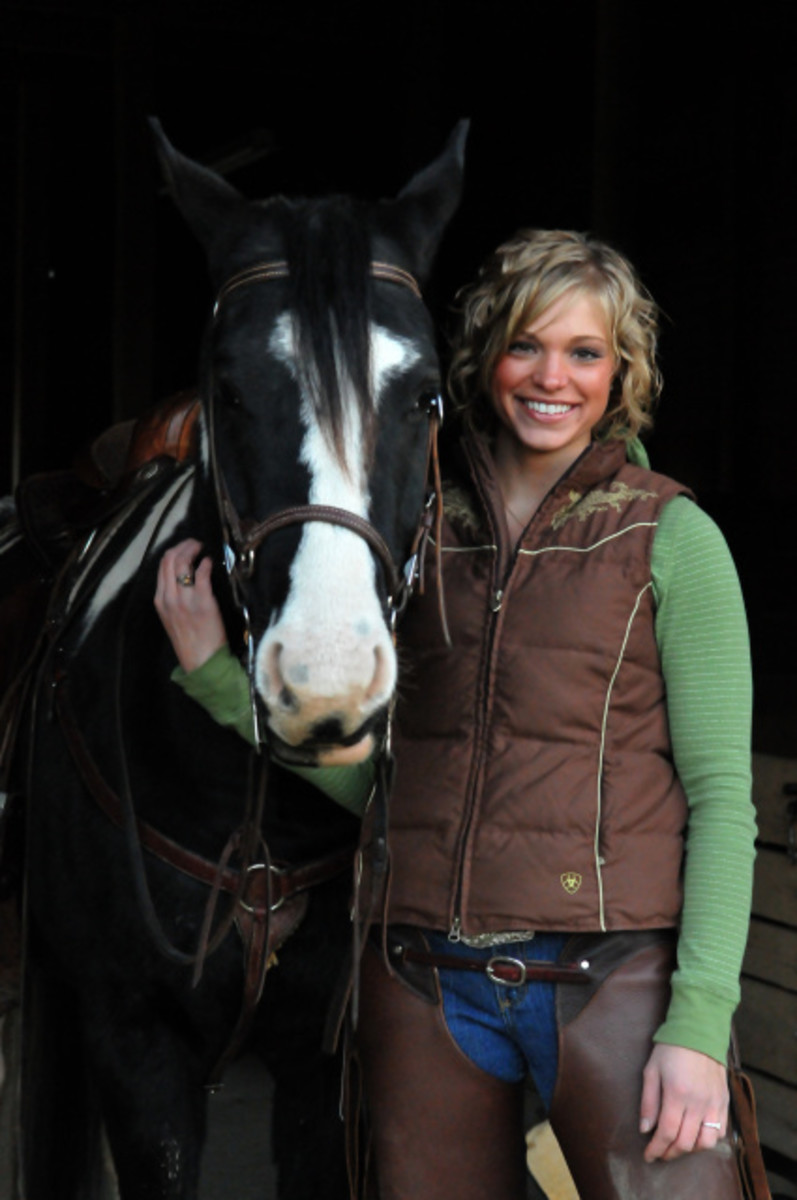A Home for Every Horse’sEquine Comeback Challenge trainer Erin Zellefrow shares her story with Horse&Rider and will provide us with updates about Ruby and her training progress in the days leading up to the event in Pennsylvania. Here, she’s provided some insight about herself, her training philosophy, and her work with rescue horses.

First, tell us about yourself.
I grew up in a small town near Erie, Pennsylvania, where we owned riding and draft horses. I currently own and operate a boarding and training facility with my husband and daughter. It feels like we live in the barn, as there is always something that needs to be done. It pretty much defines who I am; it’s a lifestyle. It’s a blessing because the whole family is involved in my workday. I do lessons throughout the week and have training horses that come and go. My passion is to see the growth in the horses; but more importantly with the owners who learn to understand how their horses think, learn, and communicate. Building the communication between horse and owner is where the real journey begins for them, as they are able to better understand one another.
What/who influenced you to turn horse training into a career?
My parents had a lot to do with me choosing to do this as a career; however, my inspiration was from a good cowboy friend from Mississippi. He inspired me to want to learn more. He gave me confidence and taught me to use my gifts and abilities to help horses with their people problems by teaching owners to understand their horses.
Where do you foresee your training career going?
I currently get a lot of “problem” or second-chance horses; I actually love it. Horses can tell you a lot with their eyes and responses to different things. They tell their own story. I like to unwrap that story day-by-day, teach them to trust, and be a leader to them. Horses are looking for a leader; that’s how they’re made (a herd animal, always establishing a pecking order). I want to be at the top of that order out of respect, not fear. And that is earned with trust, confidence, and boundaries. So as far as my training goals, I get to live them daily. However, I would like to reach a wider audience to be able to help people better communicate with their horses. That’s what horsemanship is, and no matter the level or discipline, it is beneficial to the partnership both on the ground and under saddle.
What are your professional goals?
A major goal that I have for the future is to start a leadership-training program for horses with a gifted friend of mine. This friend has inspired me to use the horses and my background to teach people about self-awareness and leadership. When working with a horse, you can learn a lot about yourself. (You may ask yourself: Am I too soft, too passive, too barbaric, too quick, too assuming, etc.?) This relates to every relationship you have with others. Horses are honest; they respond to pressure and learn from release. They require leadership to get the response you are looking for, and if you’re not their leader, they’ll become yours. (It’s never a good idea to have 1,000- to 2,000-pound animal in charge.)
What encouraged you to get involved with training rescue horses (in particular, ANNA)?
The ANNA rescue is operated by one of my closest friends. She’s an amazing businesswoman, but more importantly has a genuine heart. Two years she asked me whether I thought a horse rescue should be added under the ANNA shelter umbrella, and if I would help her. It started small, and it took off a few short months later. We have such an amazing, knowledgeable team with diverse strengths and personalities, but with the same passion and goals. I love to work with the rescue horses because they represent so many different backgrounds and personalities. I enjoy establishing a relationship with them and then see them move onto a good future with the right home.
What is your favorite training tool and/or exercise?
My favorite training tool is the round pen. I start every horse in the round pen; it’s a natural way for them to learn and read me. I can add and release pressure from a safe distance, which is necessary for some horses, and from there we can establish an understanding.
How did you become involved with the Equine Comeback Challenge?
An ANNA team member submitted an application for me to be considered for the Equine Comeback Challenge. I received an email that said that I’d been chosen along with a picture of the horse that I’d be working with.
What do you hope to learn from the experience?
So far, I’ve learned a lot about myself. Ruby has a challenging, unique personality. Aside from her barn name, I have a few nicknames for her. I call her “Miss K” because she reminds me of my daughter’s friend Kaylin who is so smart and downright sweet, but who can’t keep her attention on anything for more than 30 seconds. Ruby is so herd-bound; I didn’t have her full attention at all for the first 30 days. I also call her “mare-be-go-round,” as she is really good at moving her feet—–constantly. We would make daily progress, but she didn’t retain the information from day to day, making it very hard for us to build a relationship and progress. She’s taught me more about patience, understanding, and how to look at the positive in situations. That’s what matters most: the growth and progress that has come thus far. Each horse learns at a different pace; comes from a different situation; and has different strengths and weaknesses, just like us. The trick is to capitalize on her strengths.
Look for more about Erin and Ruby in future blog posts. Follow Horse&Rider on Facebook to keep up with the pair.







